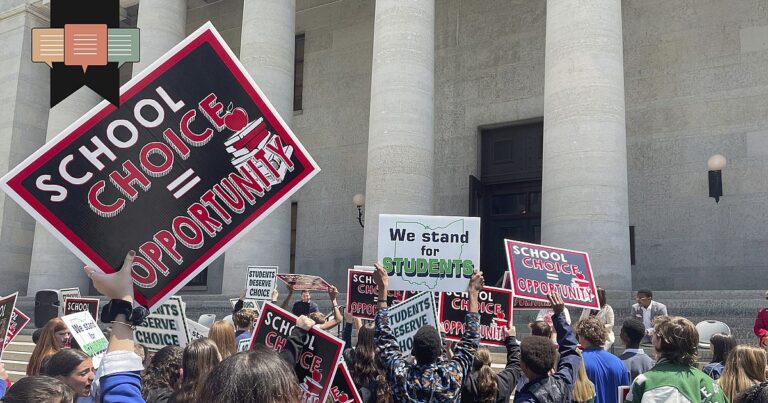“Parents have a prior right to choose the type of education provided to their children.”
This statement is found in the 1948 United Nations Universal Declaration of Human Rights. For the majority of American parents today, unless they can afford to attend a private school or homeschool, there is no real educational “choice” for them. children. Instead, parents benefit from a broken public school system that benefits from a monopoly of tax dollars.
Today, most parents in the United States do not have a choice in what education their mandated tax dollars go toward. And if you live in an area like mine, education taxes go up every year. But what is the purpose? Better test results? Better social outcomes? The data reveals the opposite. By most metrics, public education is failing. If this were any other product, the company would go out of business. Instead, we continue to pour money into the problem and keep disadvantaged students trapped in a destructive loop of captive dependency with no way out. This is how monopoly works. Monopoly eliminates incentives to improve.
School choice initiatives taking place across the country are an attempt to break this rigid public school monopoly, and by allocating tax dollars to the education that parents, rather than the government, choose, give parents more control over their children. It seeks to provide true choice in education.
At the time of writing, 29 states have implemented some form of school choice program through education savings accounts, vouchers, tax credit scholarships, or tax credit education savings accounts. However, many programs have limited eligibility. Only 16 states have universal school choice. If you look at a map of states with school choice, you’ll see that red states support it and blue states oppose it. why? Is a public school monopoly consistent with progressive objectives?
But strangely, many red states are missing from the school choice map, including Kentucky, where I live. On Nov. 5, voters will have a chance to amend the state constitution and put an end to activists on the state Supreme Court who declared school choice laws unconstitutional. But like other states, the vote faces significant headwinds from the political right and even some Christian groups.
I believe Christians should support school choice out of love for their neighbors and their children. School choice gives parents control over their children’s education, improves all schools, and dismantles the progressive education cartel.
Thanks in part to an activist U.S. Department of Education and ideologically obsessed teacher colleges across the country, the primary agenda of public schools has changed from academic excellence to woke indoctrination.
Simply put, without school choice, disadvantaged families are forced to attend unhealthy public schools. They have no real options. Thankfully, some families have the means to choose an education that does not actively undermine their children’s beliefs and values, but many do not. Wouldn’t it be nice if we could expand access to this option? Why would we give our neighbors’ children not just a poor education, but a very progressive U.S. Department of Education that doesn’t hesitate to indoctrinate our children? Do we want our children to be dependent on their education? School choice affirms the fundamental right of parents to choose the education that is best for their children.
School choice improves all schools. Competition is good because it encourages improvement. Public schools are failing because there is no incentive to improve. Public funding is not linked to educational outcomes. Instead, taxes increase each year to fund public schools. Research shows that this increase in funding does not improve education, but rather subsidizes administrative overreach.
Some Christians have expressed concern that school choice could lead to a mass exodus of students from public schools. Is that loving? First, these projected results should tell you everything you need to know about the state of public schools. Indeed, in the short term, public school enrollment will decline as parents choose the education that is best for their children. But then public schools will need to ask tough questions about why kids flock to other schools and improve their products.
Universal school choice would benefit American education across the board: public, private, charter, co-op, and homeschool. Monopoly hinders improvement, but true competition fosters improvement.
Unlike many anti-school choice activists who grew up attending private schools, I attended a public school in a small rural town. It was a peaceful place in many ways. I’m grateful for that experience. But unfortunately, even in my rural hometown, that world has passed. Thanks in part to an activist U.S. Department of Education and ideologically obsessed teacher colleges across the country, the primary agenda of public schools has changed from academic excellence to woke indoctrination. Why are local school libraries stocked with pornographic books for elementary school students? Why are administrators encouraging children to “transition” their gender while keeping parents silent? Why is “sex education” being taught to children at increasingly younger ages, and why is it Is it becoming increasingly blatant and bizarre? Why are harmful technologies being introduced uncritically? Why are standardized tests and math considered racist? Taxpayers are subsidizing this progressive propaganda machine because we have no choice. That’s enough.
Across the country, we should be concerned about the decline in morals, mental health, academic achievement and social cohesion. Progressive John Dewey understood the cultural power of public schools and introduced sweeping reforms in the 20th century to further his goals. In many ways, we live in Dewey’s world, with taxpayers writing the checks. It’s time to challenge the progressive stranglehold, improve education, and give parents choice again. Love for our neighbors and their children should motivate us.


